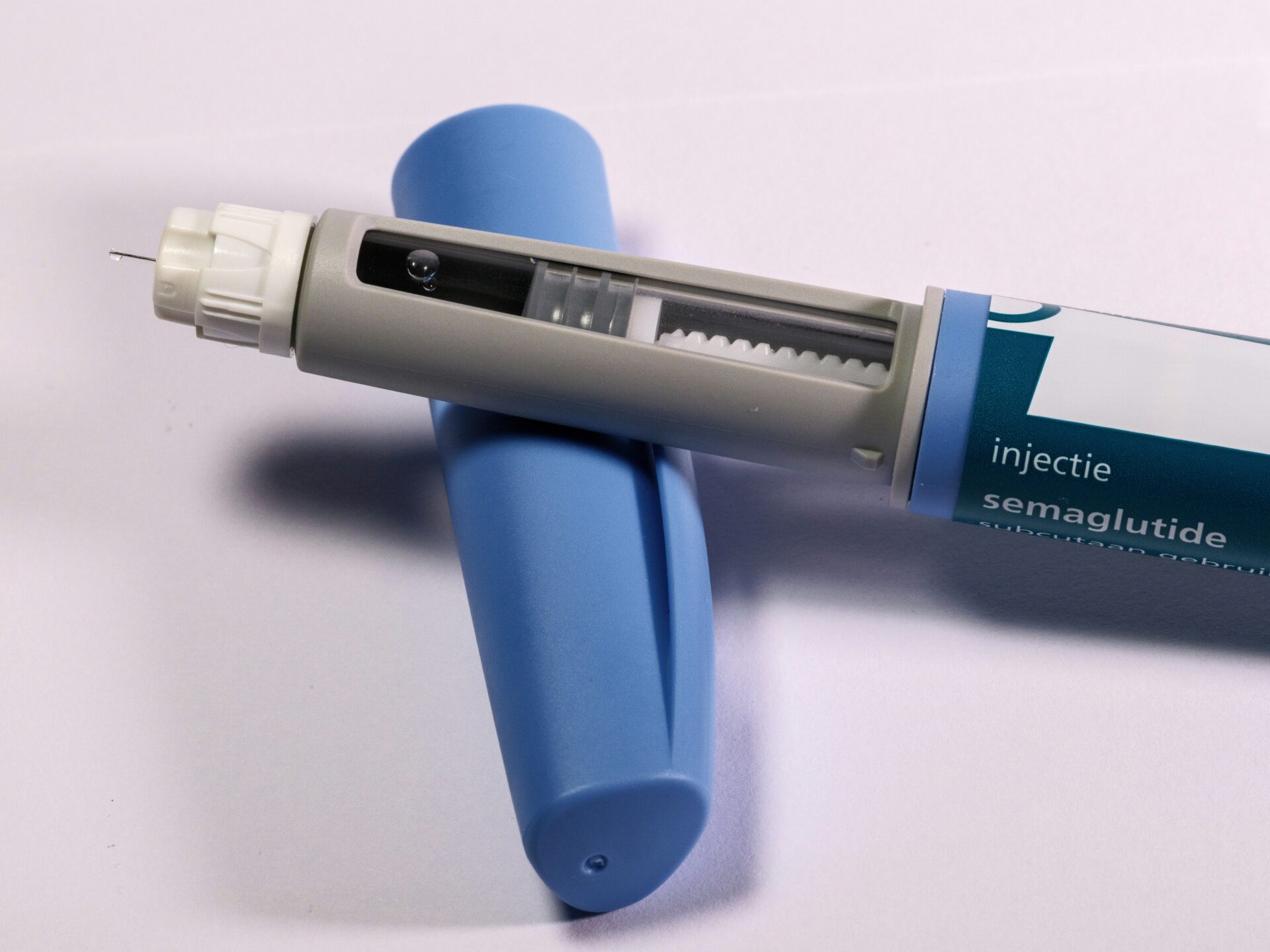If you’ve started taking a GLP-1 medication like Ozempic, Wegovy, or Zepbound and aren’t seeing the weight loss results you expected, you’re not alone. While these medications can be highly effective for many people, research shows that approximately 10-15% of patients experience minimal or no weight loss, even when following their prescribed regimen.
As a registered dietitian who works with patients on GLP-1 medications, I’ve seen firsthand how frustrating this can be. The good news? Understanding why these medications might not be working for you is the first step toward finding a solution that does.
Let me walk you through the five most common reasons why GLP-1 drugs may not be delivering the weight loss results you’re hoping for.
1. Your Body Has Developed Medication Tolerance
One of the most overlooked reasons for stalled weight loss on GLP-1 medications is tolerance. Just as your body can adapt to other medications over time, some patients develop a reduced response to semaglutide or tirzepatide after several months of use.
A 2023 study published in Diabetes, Obesity and Metabolism found that a subset of patients experienced a plateau in weight loss after 6-8 months of treatment, even when maintaining the same dose. The exact mechanism isn’t fully understood, but researchers believe it may involve changes in receptor sensitivity or metabolic adaptation.
What this looks like: You may have lost weight initially but have hit a plateau that lasts several weeks or months, despite no changes in your diet, exercise, or medication adherence.
2. Lifestyle Factors Are Working Against the Medication

GLP-1 medications are powerful tools, but they’re not magic pills. They work best as part of a comprehensive approach that includes nutrition and physical activity modifications.
Many patients assume the medication will do all the heavy lifting. While GLP-1s do reduce appetite and slow gastric emptying, they can’t overcome a diet that’s significantly higher in calories than your body needs, chronic sleep deprivation, or high stress levels that drive cortisol production and fat storage.
Common lifestyle factors that can interfere with weight loss include:
- Consuming calorie-dense beverages like alcohol, sugary coffee drinks, or juices that don’t trigger the same satiety signals as solid food
- Eating highly processed foods that are easy to overconsume despite reduced hunger
- Getting less than 7 hours of sleep per night, which disrupts hunger hormones leptin and ghrelin
- Chronic stress that elevates cortisol and promotes abdominal fat storage
- Sedentary behavior that reduces your total daily energy expenditure
A 2022 clinical trial in The Lancet demonstrated that participants who combined semaglutide with intensive lifestyle intervention lost an average of 15.3% of their body weight, compared to 9.6% with medication alone.
3. You're Not Taking the Medication as Prescribed
Inconsistent dosing is one of the most common- and most fixable- reasons for poor results with GLP-1 medications.
These medications require a specific titration schedule, starting at a low dose and gradually increasing over several weeks or months. This gradual increase helps minimize side effects and allows your body to adjust. If you’re missing doses, taking them at inconsistent times, or not advancing to the therapeutic dose your doctor prescribed, you may not be getting the full benefit.
Additionally, some patients stop their medication temporarily due to side effects like nausea or gastrointestinal discomfort. While these side effects are often temporary and improve with time, stopping and restarting the medication can reduce its effectiveness.
Important considerations:
- Injectable GLP-1s like Ozempic and Wegovy must be administered on the same day each week for optimal effectiveness
- The therapeutic dose (the dose where most patients see significant results) is typically reached after 3-4 months of titration
- Proper injection technique and site rotation matter for consistent absorption
4. Underlying Medical Conditions Are Affecting Your Results
Certain health conditions can significantly impact how well GLP-1 medications work for weight loss, even when taken correctly.
Insulin resistance and PCOS: Patients with severe insulin resistance or polycystic ovary syndrome (PCOS) may have a more complex metabolic profile that requires additional intervention beyond GLP-1 therapy alone. While tirzepatide (sold as Mounjaro and Zepbound) has dual action on both GLP-1 and GIP receptors and may be more effective for insulin-resistant patients, some individuals still need additional metabolic support.
Hypothyroidism: An underactive thyroid significantly slows metabolism, making weight loss difficult regardless of medication. If your thyroid hormone levels aren’t optimized, GLP-1 medications may not be as effective.
Medications that promote weight gain: Certain prescription medications can counteract the weight loss effects of GLP-1s, including some antidepressants, antipsychotics, corticosteroids, and beta-blockers. A 2021 review in Obesity Reviews found that patients taking weight-promoting medications alongside GLP-1s had significantly reduced weight loss compared to those not taking these drugs.
Genetic factors: Emerging research suggests that genetic variations in GLP-1 receptor function may influence how well individuals respond to these medications, though this area needs more study.
5. Your Expectations Don't Match Realistic Outcomes
Certain health conditions can significantly impact how well GLP-1 medications work for weight loss, even when taken correctly.
Insulin resistance and PCOS: Patients with severe insulin resistance or polycystic ovary syndrome (PCOS) may have a more complex metabolic profile that requires additional intervention beyond GLP-1 therapy alone. While tirzepatide (sold as Mounjaro and Zepbound) has dual action on both GLP-1 and GIP receptors and may be more effective for insulin-resistant patients, some individuals still need additional metabolic support.

- Hypothyroidism: An underactive thyroid significantly slows metabolism, making weight loss difficult regardless of medication. If your thyroid hormone levels aren’t optimized, GLP-1 medications may not be as effective.
- Medications that promote weight gain: Certain prescription medications can counteract the weight loss effects of GLP-1s, including some antidepressants, antipsychotics, corticosteroids, and beta-blockers. A 2021 review in Obesity Reviews found that patients taking weight-promoting medications alongside GLP-1s had significantly reduced weight loss compared to those not taking these drugs.
- Genetic factors: Emerging research suggests that genetic variations in GLP-1 receptor function may influence how well individuals respond to these medications, though this area needs more study.
What to Do If You're Not Losing Weight on a GLP-1 Medication
If you’ve been taking your GLP-1 medication as prescribed for at least 3-4 months and aren’t seeing results, here are the steps I recommend:
- Have an honest conversation with your healthcare provider. Bring a detailed food log, your medication schedule, and any relevant health changes. Your doctor may need to adjust your dose, rule out underlying conditions, or consider switching to a different GLP-1 medication. Remember that semaglutide (Ozempic/Wegovy) and tirzepatide (Mounjaro/Zepbound) work slightly differently, and switching between them may yield better results.
- Work with a registered dietitian. A dietitian can help you optimize your nutrition to work synergistically with your medication. We can identify hidden calorie sources, ensure you’re getting adequate protein to preserve muscle mass during weight loss, and create a sustainable eating pattern that supports your goals without feeling restrictive.
- 3. Evaluate your lifestyle factors. Take an honest look at your sleep quality, stress management, physical activity, and alcohol consumption. Even small improvements in these areas can make a significant difference in how well your medication works.
- Get comprehensive lab work. Ask your doctor to check your thyroid function (TSH, free T3, free T4), fasting insulin, hemoglobin A1c, and vitamin D levels. Addressing any deficiencies or imbalances can improve your response to treatment.
- Consider whether this medication is right for you. GLP-1 medications are powerful tools, but they’re not the only option. Some patients respond better to other weight loss medications, combination therapies, or comprehensive lifestyle interventions. There’s no shame in exploring alternatives if one approach isn’t working.
The Bottom Line
GLP-1 medications like Ozempic, Wegovy, Mounjaro, and Zepbound are revolutionizing weight loss treatment, but they don’t work equally well for everyone. If you’re not seeing results, it doesn’t mean you’ve failed or that weight loss is impossible for you—it means you need a personalized approach that addresses your unique metabolic, lifestyle, and medical factors.
The most successful patients I work with view these medications as one component of a comprehensive strategy, not a standalone solution. By combining the right medication with nutrition optimization, consistent physical activity, adequate sleep, and stress management, most people can achieve meaningful, sustainable weight loss.
If you’re feeling frustrated or discouraged, please reach out to your healthcare team. You deserve support, answers, and a plan that works for your body and your life.
This article is for informational purposes only and is not a substitute for professional medical advice, diagnosis, or treatment. Always consult with your physician or registered dietitian before making changes to your medication or treatment plan.
Free Guide!
Sail Toward Healthier Cooking
Master the Art of Practical Ingredient Swaps


How to Lower Cholesterol Naturally: A Registered Dietitian’s Grocery List and Snack Guide
Discover evidence-based strategies, a screenshot-worthy grocery list, and RD-approved snacks to reduce LDL cholesterol by up to 30% through diet alone. Table of Contents Why

Diabetes Management Without Medication: RD’s Action Plan
Can you really manage diabetes without medication? If you’ve heard conflicting advice or felt overwhelmed by where to start, you’re not alone. This article explores what the science actually says about lifestyle-based diabetes management, who it works best for, and how small, sustainable changes can lead to real improvements in blood sugar control.

Why You’re Not Losing Weight on GLP-1 Medications: A Dietitian’s Perspective
Taking a GLP-1 medication but not seeing weight loss? You’re not alone. Discover the five key reasons why drugs like Ozempic and Wegovy may not be working for you, plus actionable steps to improve your results with guidance from a registered dietitian.

The Importance of Micronutrients: Unraveling the Nutritional Gap
With today’s dietary restrictions, and the depletion of nutrients in our food, achieving optimal nutrition solely through food intake has become increasingly challenging, and now micronutrients play a crucial role.

“Nutrition Experts: Why You Should Consult a Registered Dietitian.”
Maintaining a healthy diet is crucial for overall well-being. With so much information and conflicting advice on the internet, navigating the world of nutrition on your own can take time and effort. An expert in food and nutrition is a registered dietitian (RD).

Elevating Health and Wellness in Newport Beach
Newport Beach is one of the most beautiful places in the US on the Southern California coast. It is known for its spectacular beaches, vibrant culture, and a deep appreciation for a healthy lifestyle.


